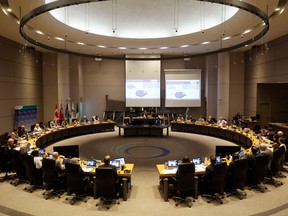There's an established pattern: The mayor sets a tax cap, a council majority backs it, staff make sure the math fits — and it's done!

The municipal draft budget tabled Wednesday, with a 2.5 per cent property tax increase, was not much of a surprise to anyone because Ottawa budgets have an established pattern to them. The mayor sets a target or cap, a council majority supports it, staff are then asked to ensure the math fits what the mayor wants, and that’s it.
So, when council directed staff last month to come back with a 2.5 per cent tax increase, there was no reason to think it would be anything but. What Ottawa residents were really looking for was the fine print. With inflation running at 6.3 per cent, higher interest rates now the norm, and Ontario’s Bill 23 cutting into on city finances, the big question was where the money to keep taxes at 2.5 per cent would come from — especially since Mayor Mark Sutcliffe had vowed there would be no cuts to programs and services. We got the answer when staff laid out their $5.5-billion spending plan.
Sign up to receive daily headline news from Ottawa Citizen, a division of Postmedia Network Inc.
Thanks for signing up!
A welcome email is on its way. If you don't see it, please check your junk folder.
The next issue of Ottawa Citizen Headline News will soon be in your inbox.
Despite a catastrophic pandemic that decimated the economy, the city saw a2.2 per cent growth in the housing supply, which yielded significant revenue. As well, city staff found $53.9 million in “savings and efficiencies,” allowing Sutcliffe to keep the property tax increase at 2.5 per cent, freeze transit fares, reduce the cost of recreational programs for children and increase funding for community safety.
Interestingly, the savings and efficiencies came from transit, with $42.7 million from a reduction in money set aside for capital spending and $4.3 million from cutting more than 100 OC Transpo buses from operation. This is interesting because all we heard year-long was that OC Transpo finances were in dire straits because of the pandemic. Who knew there were enormous savings to be made from the transit budget?
All in all, you could say “job well done” by Sutcliffe, particularly because there are no cuts to services and programs as many feared. But Sutcliffe’s feat is not a huge surprise. Mayors often pull out all the stops, especially in their first budget, to keep campaign tax promises. But as is often the case, the pain comes in the following years, and as Sutcliffe noted, next year could be tough, tougher still, if higher levels of government don’t step up to help. “Without the appropriate level of support from our provincial and federal governments, we will have significant pressures on our finances next year and beyond, particularly in transit and infrastructure,” he said.
But that’s an issue to worry about tomorrow. For now, promises made, promises kept.
The city now faces a month of public consultations before the budget goes to council for approval on March 1. The question is whether anything beyond talk will come out of these exercises. One of the longstanding criticisms of the budget process is that the draft budget is so carved in stone, nothing ever changes no matter what residents say at public hearings.
Take Ottawa Public Health. Its 2023 budget is $128 million, up just about $1.3 million from last year, to stay within the 2.5 per cent cap set by Sutcliffe. Ottawa saw 381 deaths from COVID in 2022, the same as the peak of the pandemic in 2020, and with the coronavirus still a menace, you’d think OPH would get more money, but no. It is caught up in the 2.5 per cent trap, and there is no room for manoeuvre, even though the city pays only 30 per cent of the budget, with 70 per cent from the province. With the cap unmovable, what often happens with these budget consultations is that money is moved around like pieces on a chessboard, everything arriving at the same preordained conclusion. So, it will be 2.5 per cent and not a decimal point higher, and it makes you wonder why we go through the trouble of budget consultations when nothing ever changes.
Perhaps something WILL change this time — but don’t bet on it.
Mohammed Adam is an Ottawa journalist and commentator.
-

Adam: The next COVID challenge — making sure people don't tune out
-

Denley: City of Ottawa's draft budget looks like a winner


